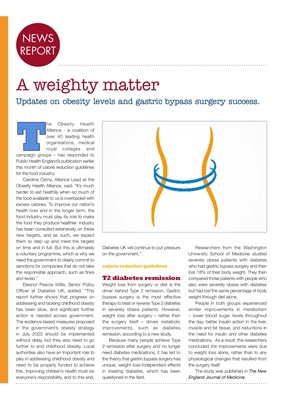
NEWS
NEWS
REPORT
Updates on obesity levels and gastric bypass surgery success.
T
he Obesity Health
Alliance - a coalition of
over 40 leading health
organisations, medical
royal colleges and
campaign groups - has responded to
Public Health England's publication earlier
this month of calorie reduction guidelines
for the food industry.
Caroline Cerny, Alliance Lead at the
Obesity Health Alliance, said: "It's much
harder to eat healthily when so much of
the food available to us is overloaded with
excess calories. To improve our nation's
health now and in the longer term, the
food industry must play its role to make
the food they produce healthier. Industry
has been consulted extensively on these
new targets, and as such, we expect
them to step up and meet the targets
on time and in full. But this is ultimately
a voluntary programme, which is why we
need the government to clearly commit to
sanctions for companies that do not take
the responsible approach, such as fines
and levies."
Eleanor Pearce Willis, Senior Policy
Officer at Diabetes UK, added: "This
report further shows that progress on
addressing and tackling childhood obesity
has been slow, and significant further
action is needed across government.
The evidence-based measures proposed
in the government's obesity strategy
in July 2020 should be implemented
without delay, but they also need to go
further to end childhood obesity. Local
authorities also have an important role to
play in addressing childhood obesity and
need to be properly funded to achieve
this. Improving children's health must be
everyone's responsibility, and to this end,
A weighty matter
Diabetes UK will continue to put pressure
on the government."
calorie-reduction-guidelines
T2 diabetes remission
Weight loss from surgery or diet is the
driver behind Type 2 remission. Gastric
bypass surgery is the most effective
therapy to treat or reverse Type 2 diabetes
in severely obese patients. However,
weight loss after surgery - rather than
the surgery itself - drives metabolic
improvements, such as diabetes
remission, according to a new study.
Because many people achieve Type
2 remission after surgery and no longer
need diabetes medications, it has led to
the theory that gastric bypass surgery has
unique, weight loss-independent effects
in treating diabetes, which has been
questioned in the field.
Researchers from the Washington
University School of Medicine studied
severely obese patients with diabetes
who had gastric bypass surgery and then
lost 18% of their body weight. They then
compared those patients with people who
also were severely obese with diabetes
but had lost the same percentage of body
weight through diet alone.
People in both groups experienced
similar improvements in metabolism
- lower blood sugar levels throughout
the day, better insulin action in the liver,
muscle and fat tissue, and reductions in
the need for insulin and other diabetes
medications. As a result, the researchers
concluded the improvements were due
to weight loss alone, rather than to any
physiological changes that resulted from
the surgery itself.
The study was published in The New
England Journal of Medicine.